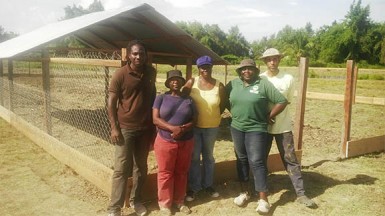To the indifferent it may seem like a modest even inconsequential project. Modest agricultural projects accompanied by even more modest chicken-rearing initiatives are a dime a dozen in rural communities. The components of this project are tucked away in two small and decidedly unimposing East Coast Demerara villages, its execution costs sufficiently modest to hardly merit mention; and yet, for the members of the Mangrove Reserve Producers Cooperative Society (MRPCS) the current assignment underpins the very essence of their being. It is an assignment that seeks, simultaneously, to bind communities and to transform lives.
The mission of the cooperative bears an uncanny resemblance to the financial backer of its mission. The Rural Enterprise Agricultural Development (READ), funded by the International Fund for International Development (IFAD) and executed through the Ministry of Agriculture, provides financial and technical backing for agricultural projects that help build poor rural communities.
On Saturday the members of the Cooperative Society were putting the finishing touches to a chicken pen in the compound of Golden Grove Secondary School. They are approaching the end of a four-month long project that commenced in February. Their mission is to create three agricultural plots and to construct two poultry pens at three schools – Golden Grove Primary, Golden Grove Secondary and Hope Estate Secondary – on the East Coast Demerara.

Another East Coast school – St Andrews Primary school- is being gifted a flower garden by the cooperative.
Of the $2 million cost of the project, a total of $1.8 million has been allocated as a grant from READ. The remaining $200,000 is being met by the cooperative.
READ had approached the co-operative some time ago with a proposal that it execute the Poultry Pens/Agricultural Plot project. Some measure of voluntary work is being done by the society and members of the schools’ Parent Teachers Associations.
The schools will each receive a 100 x 50 fenced plot along with garden tools. The poultry pens are each built to accommodate 100 chickens. They will be fitted with automatic watering systems and feeders.
While the Hope Secondary School plot is yet to be officially handed over the students have already begun using it. Some of the cash crops are already being sold within the small PTA community.
But that is not where the initiative stops. The completed agricultural plots will provide training for students of the Hope and Golden Grove Secondary schools ahead of their Caribbean Secondary Education Certificate Agricultural Science examinations. The schools’ PTAs, meanwhile, look forward to helping to market the farm produce in the local communities. As for the MRPCS, it has already established itself as a modest producer of in the agro-processing sector, producing honey, candles, tamarind balls, pepper sauce, food seasonings among other things. What the society is hoping is that after its current assignment is completed READ will support the creation of a processing plant that will enable the society to expand its operations.
READ, the MRPCS members say, has already agreed to support the project and they are already talking about a time when their processing plant may serve as a market for produce from the farms that they helped to create. More than that, they anticipate that the cooperative’s entrepreneurial venture will create employment within the community as well as expand their reach beyond the community.




